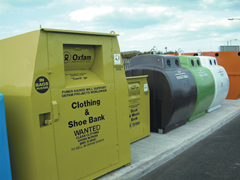Waste management review
 The revised waste management planning policy statement should encourage innovation and technology, according to Environment Committee Chair Cathal Boylan. Meadhbh Monahan reports.
The revised waste management planning policy statement should encourage innovation and technology, according to Environment Committee Chair Cathal Boylan. Meadhbh Monahan reports.
A review of Planning Policy Statement 11 (PPS11), which covers the development of waste management facilities, is currently underway.
In November, Edwin Poots said: “The existing policy is out of date. We need to take account of recent changes to European legislation such as the new revised Waste Framework Directive. I am also honouring a commitment given in the 2006 Waste Management Strategy to work towards revising [PPS11] by 2011.”
The revised Waste Framework Directive stated that EU member states must implement the “laws, regulations and administrative provisions necessary to comply with this directive” by 12 December 2010. Interested parties, such as the Assembly’s Environment Committee, submitted their views to a consultation on the review which ended on 31 December.
The Chair of that committee, Cathal Boylan, tells agendaNi: “I can confirm members are fully in support of the department’s aim to promote the highest environmental standards in development proposals for waste management facilities. It is essential that planning policy statements are sufficiently up to date to support the department’s waste policies not least to ensure that we meet our obligations to European Directives and the Waste Framework Strategy.”
Putting the review in context, Boylan explains: “PPS11 has now been in place for 10 years during which there have been a multitude of changes to the way in which waste has to be managed. There has also been a significant change in the amount of waste produced and the options available for waste management.”
When asked what changes the committee proposes, Boylan responds: “The Department maintains that effective application of the new waste hierarchy, as required by the European legislation, will undoubtedly reduce the amount of waste being sent to landfill including biodegradable waste and should help to meet targets established in the Programme for Government’s public service agreements.
“The committee will be monitoring this closely and will seek to assess the revisions made to PPS11 to achieve this and ensure that waste is treated appropriately.”
Boylan is keen to stress that the review of PPS11 should not just be viewed as necessary in order to comply with European legislation.
“Managing waste effectively is part and parcel of delivering good society and making where we live a nicer place to be.”
He adds: “Key to this is making people aware of the waste hierarchy which encourages the prevention of waste being produced in the first place, makes provision for materials to be re-used or recycled and then looks at opportunities for energy recovery with disposal being an absolute last resort for a small amount of waste.”
Once the department has completed its review the committee will receive a briefing from officials and will “discuss and formalise” its position.
Boylan adds that during the Environment Committee’s inquiry into climate change in 2009, it recommended that the department should develop a “series of measures” to be delivered by local authorities that would change attitudes and behaviours in relation to waste. It also said that small to medium enterprises should be provided with more assistance in their waste management by local authorities.
Boylan concludes: “I am therefore confident that members take this issue very seriously and will be endeavouring to ensure that PSS11, among other measures, helps to support better waste management by being supportive and encouraging of innovation and technology.”





